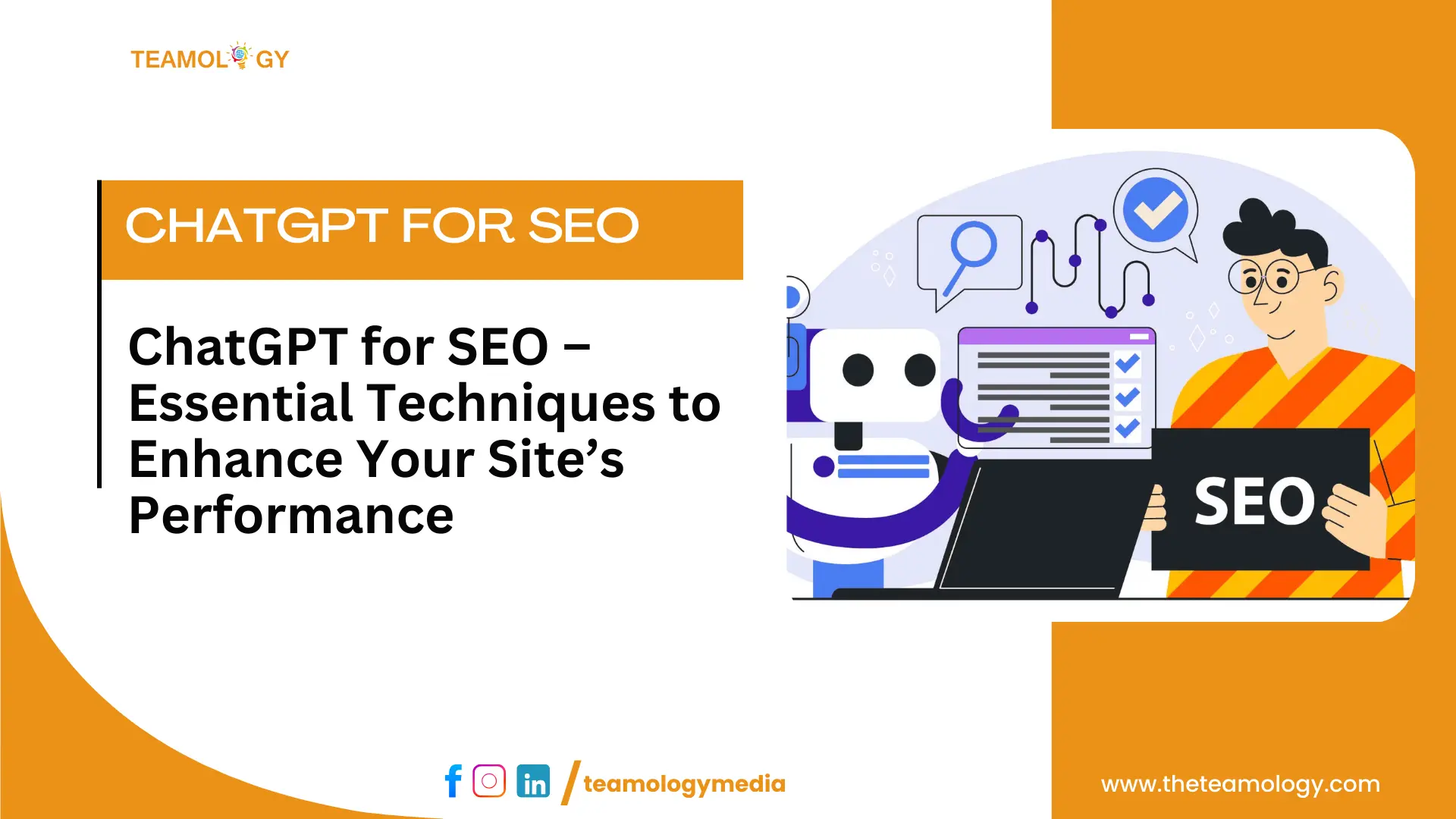Are you an SEO professional? Then, ChatGPT for SEO must be a genuine concern for you.
Imagine keyword research becomes as easy as your daily chat. Content creation is also not taking as much effort as it used to be. Seems like a dream, right? No, it is not. ChatGPT is bringing a seismic shift in the SEO world.
But there is good news! ChatGPT is not here to replace SEO folks, but it can become your secret weapon, handling all your meticulous SEO tasks. Let’s explore how ChatGPT can revolutionize SEO.
What is ChatGPT?
ChatGPT is an artificial intelligence that can talk to you like a friend. If you ask anything, it can answer your queries in a human-like style. If you wish, you can also create high-quality blogs or articles using this tool in your chosen style and tone. it can also craft your emails, create compelling social posts, and even write complex code for you, all quickly and easily.
So, how does ChatGPT work? It is a highly advanced language model capable of comprehending and generating high-quality human-like content. If you give it a prompt (nothing but a query), it can process it, refer to its vast pool of text-based knowledge bases to predict the most relevant and coherent response, and then present it to us.
How ChatGPT Can Help in On-Page SEO
Here a detailed tips and tricks that ChatGPT uses to help you with your SEO efforts.
Keyword research
Keyword research is finding the relevant keyword or search term for your content that makes the search engine’s job of finding your content so much easier and faster. This is the first and very important step of SEO.
Let’s understand this with a prompt.
PROMPT: Think of yourself as a keyword research specialist with extensive knowledge and experience in SEO. Provide some Long-Tail and LSI (Latent Semantic) keyword suggestions for my topic “ChatGPT for SEO”.
Here is the response from ChatGPT:
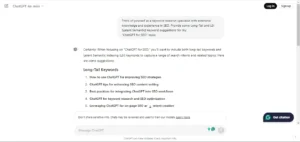
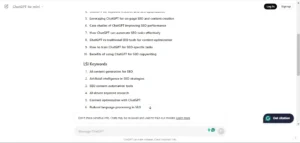

So you can see from the response that ChatGPT has provided some Long-tail and LSI keywords for the given topic. One thing to remember here is that these keywords may not have a high search volume. But they can be good for brainstorming. I recommend you consult professional keyword research tools like Semrush, Moz, or Ahref to obtain a list of keywords that have high search volume or low keyword difficulty.
You can also ask ChatGPT to cluster your “ChatGPT SEO keyword” based on semantic relevance. When we prompted ChatGPT to do that, we got the following response:


Although this response does not come close to what you can discover from Semrush still it is still a good start.
Another very important aspect of SEO is understanding the intent behind these keywords. After all, you, as an SEO expert, should know the real intention of your users to search for something on the internet.
Here, we will first prompt ChatGPT to extract keywords from the seed keyword “ChatGPT for SEO,” then ask it to categorize those keywords by intent.
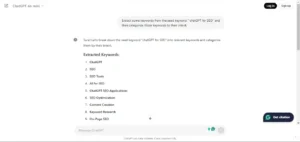

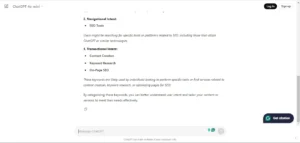
As you can see here, there are three types of keyword intent:
Informational Intent: Such keywords indicate that the user intends to gather information about the topic.
Navigational Intent: The users intend to navigate to a specific webpage, tool, or course related to the topic.
Transactional Intent: These keywords signal that users have decided to purchase a product or service.
Commercial intent: These keywords signal that the user is researching potential products and services with the intent to purchase in the near future.
Content creation and optimization
Generating blog post ideas
ChatGPT can be very helpful in generating blog ideas. Suppose you are a professional blogger and want to write on SEO, but the so-called writer’s block has got the better of you. No worries. Use ChatGPT and prompt it to suggest a few blog post ideas on SEO. You will be amazed at how easily ChatGPT comes up with unique blog ideas.
PROMPT: Suggest a few blog post ideas for the topic – SEO.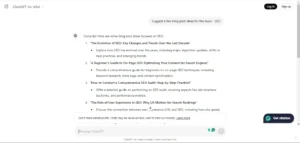
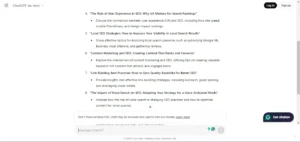
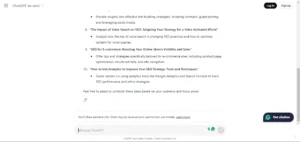
Writing engaging content outlines
Now let me tell you a secret! I have asked ChatGPT to generate a content outline for the blog you are currently reading. I would have to brainstorm for hours to design the outlines of this blog if I had to do it myself. But ChatGPT has certainly saved my time.
PROMPT: Suggest a detailed outline for my blog post on “ChatGPT for SEO.”
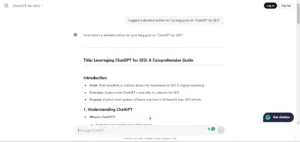
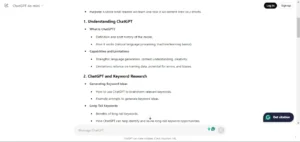
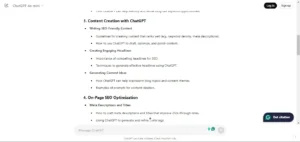
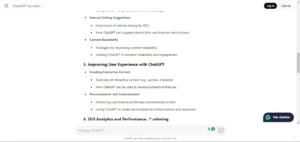
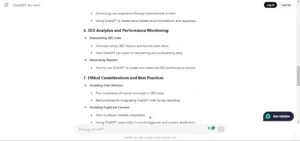
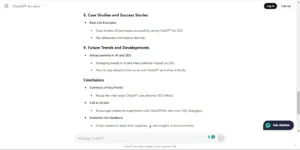
Improving content readability
If you want to rank your web content, it must score high on readability. Suppose you are creating content on technical topics like SEO, where you need to explain various technical terms in simple, easy-to-digest language. You can put ChatGPT to work, as it is a great tool for simplifying complex topics.
PROMPT: Make the following blog more readable to my target audience.
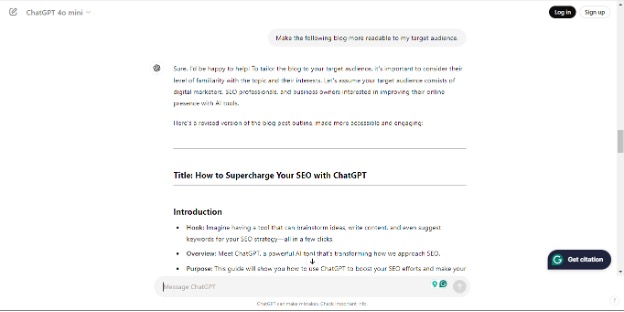
Optimizing images and alt tags with ChatGPT
Your content needs images. Why? They make your content more intuitive. But you need to optimize your images for SEO. Stat shows billions of image searches on Google Lens each month. You will want your content images to pop up on search engine result pages, too. One good technique to optimize your images is to add alternative text. Alternative text is a go-to way to describe those images. You can use ChatGPT to do this part of SEO for you.
Proofread your content
Often, our first draft is full of typos, faulty sentence structures, and grammatical mistakes. If you publish such erroneous content, it won’t help your SEO. However, proofreading is a time-consuming affair. So you can always outsource that part of your SEO job to ChatGPT. This AI tool is brilliant at proofreading any piece of content at a rapid pace.
Identifying content gaps
You can ask ChatGPT to spot gaps in your content. It will run a content audit and tell you whether you have left any uncovered areas that your competitors have addressed.
PROMPT: Analyze my blog ” chatGPT for SEO”. Identify the areas that I left uncovered. Also, spot areas where my competitors have excelled. Suggest ways to fill those gaps.

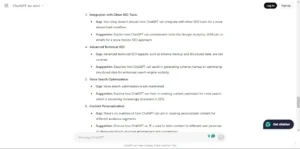

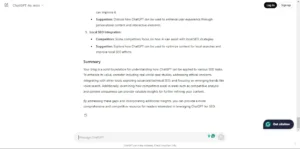
Meta descriptions and title tags
ChatGPT can be a very useful tool for generating meta descriptions and title tags for your content. The tool can produce a persuasive yet detailed summary of your webpage and catchy headlines that adhere to SEO constraints.
PROMPT: Suggest a max 160-character meta description that draws user attention and a 50-60-character long catchy title for my blog “chatGPT for SEO”. I have attached my blog content below.

How ChatGPT Can Help in Off-Page SEO
1. Identify websites for guest post outreach
Now that you have crafted high-quality SEO-optimized content, you need to find high-authority sites for guest posting. This will improve your chances of ranking highly in search engines by generating high-quality backlinks. ChatGPT can make your life a lot easier in this case.
PROMPT: Suggest a few high-authority websites for guest posting for my blog “ChatGPT for SEO”.
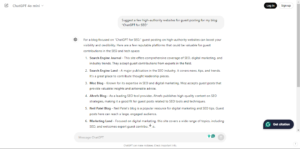

2. Generating outreach emails for backlink acquisition
Once ChatGPT finds authority sites for guest posting, you have to connect with the site owners to convince them to host your content on their sites. ChatGPT can help you draft professional, compelling outreach emails.
PROMPT: Draft a persuasive outreach email for my blog “ChatGPT for SEO” with a professional and engaging tone.
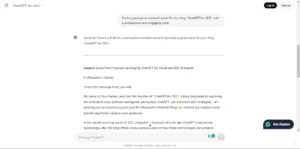

3. Anchor text recommendation
Anchor text links your webpage to other internal pages or external websites. Use ChatGPT to recommend anchor text that does not look spammy or irrelevant to your content.
PROMPT: Recommend anchor text for my blog “ChatGPT for SEO” that looks natural and not too long. I have attached my blog content below.
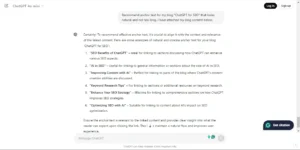
How ChatGPT Can Help in Technical SEO
1. Writing and optimizing robots.txt
Robots.txt helps web crawlers access certain web pages and prevents them from accessing others. You can use ChatGPT to set rules for robots.txt.
PROMPT: Create rules for robots.txt to prevent crawlers from accessing the “Author Page” but allow them to crawl other pages within my domain.
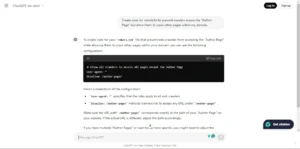
2. Writing and optimizing .htaccess files
Suppose you have recently updated your website with a new URL. However, your existing audience may not know this and may still try to visit your site using the old URL. An .htaccess file on a web server redirects visitors from an old URL to a new one. You can always ask ChatGPT to rewrite .htaccess rules to redirect your old URL to a new URL.
3. Generating RegEx patterns
Regular Expression is a coding language to find pattern matches in the text. It is a powerful tool for searching and extracting information from your content. As an SEO guy, you would like to skip this step because generating RegEx can be complex. Hire ChatGPT to solve your purpose.
4. Generating XML sitemaps
XML sitemaps help list a website’s important pages so that Google crawlers can find them. It also helps search engines understand your site’s structure. ChatGPT may come in handy in creating an XML sitemap format for your webpage.
PROMPT: Write the format of an XML sitemap for my blog “chatGPT for SEO.”
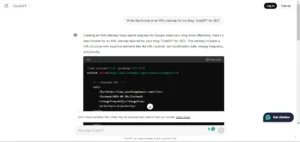
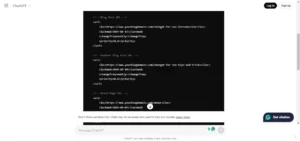

ChatGPT : Your new SEO co-pilot
AI penetration in SEO is unavoidable. Although creativity and critical thinking are some of the skills that make human professionals irreplaceable in SEO, you still need ChatGPT to supercharge your SEO efforts. Use ChatGPT as your ideation or optimization assistant and witness an improved ranking in search engines.
FAQs
Can ChatGPT replace human SEO experts?
Is ChatGPT's generated content considered duplicate content?
What are the limitations of using ChatGPT for SEO?

